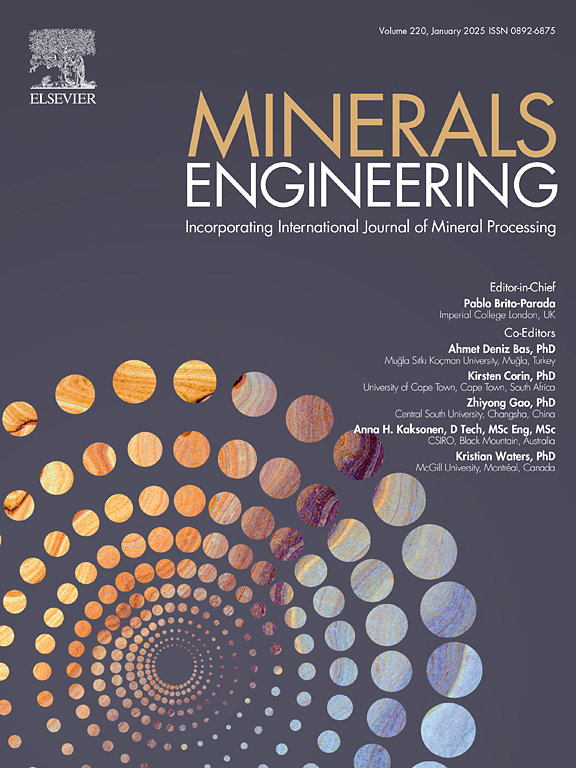Review of technologies to extract lithium from hard rock lithium minerals
IF 5
2区 工程技术
Q1 ENGINEERING, CHEMICAL
引用次数: 0
Abstract
Lithium (Li) is becoming increasingly important for energy applications driven by rapid advancements in lithium-ion battery technologies, the move toward vehicle electrification, and increasing demands for grid energy storage systems. Although brine deposits are the main lithium source, the role of lithium-bearing minerals for producing lithium salts is expanding because of their widespread availability and historical market establishment. Methods of extracting lithium from ores fall into five key categories: acid leaching, alkaline leaching, salt roasting, pressure leaching, and chlorination roasting. Sulfuric acid leaching is particularly efficient for processing spodumene ores and is expected to maintain its lead amongst extraction techniques that use spodumene as the primary raw material. Additionally, a technique combining sulfuric and hydrofluoric acid has shown potential for lowering energy consumption compared with the conventional sulfuric acid process, but this benefit must be carefully weighed against the environmental and operational impacts of the use of fluorides. Pressure leaching has proven especially effective for treating lepidolite and has achieved high recovery rates of lithium and valuable by-products such as rubidium and cesium, yielding high-purity products. Although this method has advanced to.
commercial production, it is still under development and requires further research to improve its performance. Chlorination roasting is an alternative lithium extraction method that can directly process a variety of lithium ores with a high extraction efficiency. Despite substantial research dedicated to chlorination roasting, further studies are essential to determine its economic feasibility, environmental sustainability, and operational safety.
从硬岩锂矿物中提取锂的技术综述
由于锂离子电池技术的快速发展、汽车电气化的发展以及对电网储能系统的需求不断增加,锂(Li)在能源应用中变得越来越重要。虽然卤水矿床是锂的主要来源,但由于含锂矿物的广泛可用性和历史上的市场建立,它们在生产锂盐方面的作用正在扩大。从矿石中提取锂的方法主要有五种:酸浸、碱浸、盐浸、压力浸和氯化焙烧。硫酸浸出在处理锂辉石矿石方面特别有效,预计将在以锂辉石为主要原料的提取技术中保持领先地位。此外,与传统硫酸工艺相比,一种将硫酸和氢氟酸结合起来的技术显示出降低能耗的潜力,但必须仔细权衡这一好处与使用氟化物对环境和操作的影响。事实证明,压力浸出对处理锂云母特别有效,并且锂和有价值的副产物如铷和铯的回收率很高,产品纯度很高。虽然该方法已进入商业化生产,但仍处于开发阶段,需要进一步研究以提高其性能。氯化焙烧是一种可替代的锂提取方法,可直接处理多种锂矿石,提取效率高。尽管对氯化焙烧进行了大量的研究,但要确定其经济可行性、环境可持续性和操作安全性,还需要进一步的研究。
本文章由计算机程序翻译,如有差异,请以英文原文为准。
求助全文
约1分钟内获得全文
求助全文
来源期刊

Minerals Engineering
工程技术-工程:化工
CiteScore
8.70
自引率
18.80%
发文量
519
审稿时长
81 days
期刊介绍:
The purpose of the journal is to provide for the rapid publication of topical papers featuring the latest developments in the allied fields of mineral processing and extractive metallurgy. Its wide ranging coverage of research and practical (operating) topics includes physical separation methods, such as comminution, flotation concentration and dewatering, chemical methods such as bio-, hydro-, and electro-metallurgy, analytical techniques, process control, simulation and instrumentation, and mineralogical aspects of processing. Environmental issues, particularly those pertaining to sustainable development, will also be strongly covered.
 求助内容:
求助内容: 应助结果提醒方式:
应助结果提醒方式:


